Scientific papers
Objective: This study aimed to develop innovative paclitaxel-loaded proliposome tablet formulations for pulmonary drug delivery.
Methodology: Various proliposome powder formulations (F1–F27) were prepared, utilizing Lactose monohydrate (LMH), Microcrystalline cellulose (MCC), or Starch as carbohydrate carriers, and Soya phosphatidylcholine (SPC), Hydrogenated soya phosphatidylcholine (HSPC), or Dimyristoyl phosphatidylcholine (DMPC) as phospholipids. The formulations were prepared at 1:5, 1:15, or 1:25 w/w lipid phase to carrier ratio, with Paclitaxel (PTX) used as the model anticancer drug.
Results: Among the 27 formulations, F3, F6, and F9 were chosen based on their excellent angle of repose (AOR), smaller vesicle size, and favorable compressibility index via Carr’s index. These selected formulations were further processed into Nano (N) vesicles through probe sonication, followed by spray drying (SD) to obtain dry powders named F3SDN, F6SDN, and F9SDN, which exhibited high yield and compressibility index values. F3 tablet formulation demonstrated uniform weight uniformity, good crushing strength, precise tablet thickness, and a short disintegration time, meeting British Pharmacopeia (BP) standards. Nebulization of F3 tablets using Ultrasonic nebulizer showed superior performance compared to Vibrating mesh nebulizer. PTX-loaded F3 tablet formulations exhibited toxicity to cancer MRC-5 SV2 cell lines while remaining safe for normal MRC-5 cell lines.
Conclusion: LMH was identified as the superior carbohydrate carrier for proliposome tablet manufacturing at a 1:25 w/w lipid to carrier ratio, demonstrating effective in-vitro nebulization via Ultrasonic nebulizer.

Comments
No comments posted yet.
Add a comment














